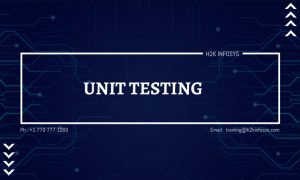Software development, Quality Assurance (QA) has become a critical function. Ensuring that products meet high standards of quality before reaching the consumer is not just beneficial but essential for companies aiming for market success. This growing need has opened numerous career opportunities for individuals skilled in QA testing. If you’re considering a career in this field, enrolling in a Quality Assurance Tester course can be a game-changer. This blog will explore how such a course can enhance your career prospects.
Understanding Quality Assurance Tester Course (QA)
How a Quality Assurance Tester Course Can Boost Your Career Prospects involves various processes designed to ensure that a product, usually software, meets specified requirements and works as intended. It encompasses different types of testing, including manual testing, automated testing, performance testing, and security testing, among others. QA testers play a vital role in identifying bugs, usability issues, and ensuring overall product quality before deployment.
Why QA Testing is Important
- Ensures Product Quality: QA testing helps identify defects and areas of improvement, ensuring that the final product is of high quality and user-friendly.
- Cost Efficiency: Finding and fixing bugs during the development phase is far less costly than post-release. QA testers save companies significant amounts of money.
- Enhances Customer Satisfaction: Delivering a flawless product improves customer satisfaction, boosts brand reputation, and enhances customer loyalty.
- Regulatory Compliance: Many industries have strict regulations that require software to meet specific standards. QA testing ensures compliance with these regulations.
The Growing Demand for QA Testers
As businesses increasingly rely on software applications, the demand for QA testers has surged. According to various industry reports, the QA testing market is expected to grow significantly in the coming years. Companies are investing heavily in quality assurance to maintain a competitive edge, which directly translates into job opportunities for skilled QA professionals.
Benefits of Taking a QA Tester Course
Enrolling in a QA tester course can provide several advantages that can significantly boost your career prospects. Here’s how:
Developing a Solid Foundation
A QA tester course provides you with the essential knowledge and skills required to excel in the field. You’ll learn about different testing methodologies, testing tools, software development life cycles (SDLC), and best practices in quality assurance. This foundational knowledge is crucial for understanding how QA fits into the broader software development process.
Hands-On Experience with Tools
QA testing involves using various tools to automate and manage the testing process. A good QA tester course will offer hands-on experience with popular tools like Selenium, JIRA, QTP, and LoadRunner. Proficiency in these tools is often a requirement for QA roles, and hands-on training ensures that you’re not just learning theory but also applying it in practical scenarios.
Learning Industry Standards and Best Practices
Quality Assurance is a field that follows strict standards and best practices. Courses often cover industry standards like ISO 9001, Six Sigma, and CMMI, which are critical for ensuring consistency and quality. Understanding these standards can set you apart from other candidates, demonstrating your commitment to delivering high-quality work.
Improved Problem-Solving Skills
QA testing is about more than just finding bugs. It requires critical thinking, attention to detail, and strong problem-solving skills. A QA tester course will challenge you to think analytically, anticipate potential issues, and develop effective testing strategies. These skills are highly valued by employers and can be beneficial in various roles.
Certification and Credibility
Completing a QA tester course often leads to certification, such as the ISTQB (International Software Testing Qualifications Board) certification. Having a recognized certification on your resume adds credibility to your profile and demonstrates your expertise and commitment to potential employers. It can also open doors to more advanced roles and higher salary prospects.
Networking Opportunities
Enrolling in a QA tester course allows you to connect with instructors, industry experts, and fellow students. These connections can provide valuable networking opportunities, giving you access to job openings, mentorship, and advice from experienced professionals. Building a network in the QA community can be beneficial for career growth and staying updated on industry trends.
Career Opportunities for QA Testers
Completing a QA tester course can open up various career paths. Here are some roles you might pursue:
Manual Tester
Manual QA tester training are responsible for manually testing software for defects. They follow test cases and document any issues they find. While it may seem basic, manual testing is crucial for understanding the user experience and catching issues that automated tests might miss.
Automation Tester
Automation testers use tools to automate repetitive testing tasks. They create scripts that can run tests automatically, saving time and increasing efficiency. Automation testing is becoming increasingly popular, and skilled automation testers are in high demand.
Performance Tester
Performance testers focus on how software performs under various conditions. They test for speed, scalability, and reliability, ensuring that the software can handle high loads without crashing. Performance testing is essential for applications that will be used by large numbers of users.
Security Tester
Security testers, or penetration testers, look for vulnerabilities that could be exploited by hackers. They ensure that the software is secure and that sensitive data is protected. With the increasing number of cyber threats, security testing is a critical area of QA.
QA Analyst
QA analysts are responsible for designing test plans, creating test cases, and analyzing test results. They work closely with developers to ensure that the product meets quality standards. QA analysts often take on a more strategic role, focusing on improving overall testing processes.
QA Manager
For those with significant experience, a QA manager role might be the next step. QA managers oversee the entire testing process, manage QA teams, and ensure that the product meets quality standards. They are responsible for setting QA policies and procedures and often report directly to senior management.
The Future of QA Testing
The future of QA testing looks promising, with several trends shaping the industry:
Increased Automation
Automation will continue to play a significant role in QA testing. As software becomes more complex, the need for automated testing solutions will grow. Automation allows for faster testing, more accurate results, and can handle large volumes of data, making it an essential tool in the QA process.
AI and Machine Learning
Artificial Intelligence (AI) and Machine Learning (ML) are starting to make their way into QA testing. These technologies can analyze vast amounts of data, predict potential issues, and even create test cases. AI and ML can enhance the efficiency and effectiveness of QA testing, making them valuable additions to any QA team.
DevOps and Continuous Testing
The adoption of DevOps practices has led to the rise of continuous testing, where testing is integrated into the development process from the start. Continuous testing ensures that quality is maintained throughout the development cycle, not just at the end. QA testers will need to adapt to these practices, working closely with developers to ensure seamless integration.
Focus on Security
As cyber threats become more sophisticated, there will be an increased focus on security testing. QA testers will need to be skilled in identifying vulnerabilities and ensuring that software is secure. This focus on security will open up new opportunities for QA professionals specializing in this area.
Conclusion
Enrolling in a Software testing course and placement can significantly boost your career prospects. With the growing demand for QA professionals and the evolving nature of the field, having the right skills and knowledge is crucial. A QA tester course provides you with a solid foundation, hands-on experience, and the opportunity to earn certifications that can set you apart in the job market. Whether you’re just starting your career or looking to advance, investing in QA training can open doors to a wide range of opportunities and pave the way for a successful and fulfilling career in technology.
By gaining the necessary skills and knowledge through a QA tester course, you position yourself as a valuable asset to companies looking to ensure the quality of their products. With the right training, you can navigate the challenges of the industry, adapt to new technologies, and build a rewarding career in Quality Assurance.


























One Response